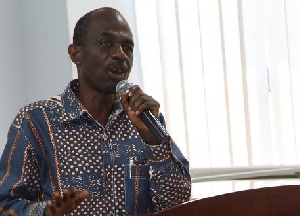 General Secretary of the NDC - Johnson Aseidu Nketia
General Secretary of the NDC - Johnson Aseidu Nketia
Some delegates and would-be aspirants for the upcoming parliamentary primaries of the ruling National Democratic Congress (NDC) have expressed misgivings over the second phase of biometric voters registration which begun yesterday, Monday, August 3, 2015 across the country.
The ruling party last year ended collecting data on its members. This was to enable the party build a credible data on its members across the country so as to help the party retain power in 2016.
However, indications are that the biometric register would be deployed for the 2016 parliamentary primaries as the voter list for that process.
Several complaints were raised by ordinary members, supporters, as well as delegates of the party after they failed to register.
Some potential aspirants who feared their supporters were going to be disenfranchised also protested and complained bitterly about the lack of public education on the process.
Consequently, the NDC hierarchy opened a second window which begun yesterday albeit unofficial, to enable all members whose data they could not capture using the Biometric Voter Registration (BVR) machine the last time round to do so.
Sources close to the party’s headquarters in Accra told Today that the BVR process would close on August 16, 2015 and immediately after that nominations will be opened for members desirous of contesting at the primaries to file their candidature.
The sources also hinted that the National Executive Committee (NEC) was likely to settle on October 2, 2015 as the date to hold the parliamentary primaries.
Accordingly a National Executive Committee meeting would take place today August 4, 2015 to firm up the date.
Already all potential aspirants are known and duly informed about the BVR process so they could mobilise their supporters to go and register.
But, according to information available to this paper, delegates and would-be aspirants were not happy, especially given the short period for the registration and the failure of the party, to do wider education and consultation.
They also felt the leadership should set specific time for the voters register to be exhibited for necessary the corrections to be done before primaries take place.
However, some delegates were of the opinion that the BVR should be discarded completely since it was likely to lead to chaos when deployed for the primaries.
They argued that during the party’s national delegates’ congress in December 2014 in Kumasi, it was agreed that nine (9) executives should be selected from each polling station to constitute the voters list for each constituency.
However, from the look of things the executives may allow the use of the BVR and this could have serious implications on the polls.
The delegates thought it was better to rely on the BVR for the national delegates’ congress instead of the parliamentary primaries.
Some incumbent Members of Parliament (MPs) who were also displeased with the entire process told this reporter that the registration should be extended and the primaries pushed to a later part of the year so as to create a level playing field for every aspirant.
They contended that conducting the primaries in October would play to the advantage of their opponents who have had the laxity of time to campaign on the ground whiles the MPs were busily engaged in official duties in Parliament.
Parliament went on recess on July 24, 2015 and would resume sitting in October.